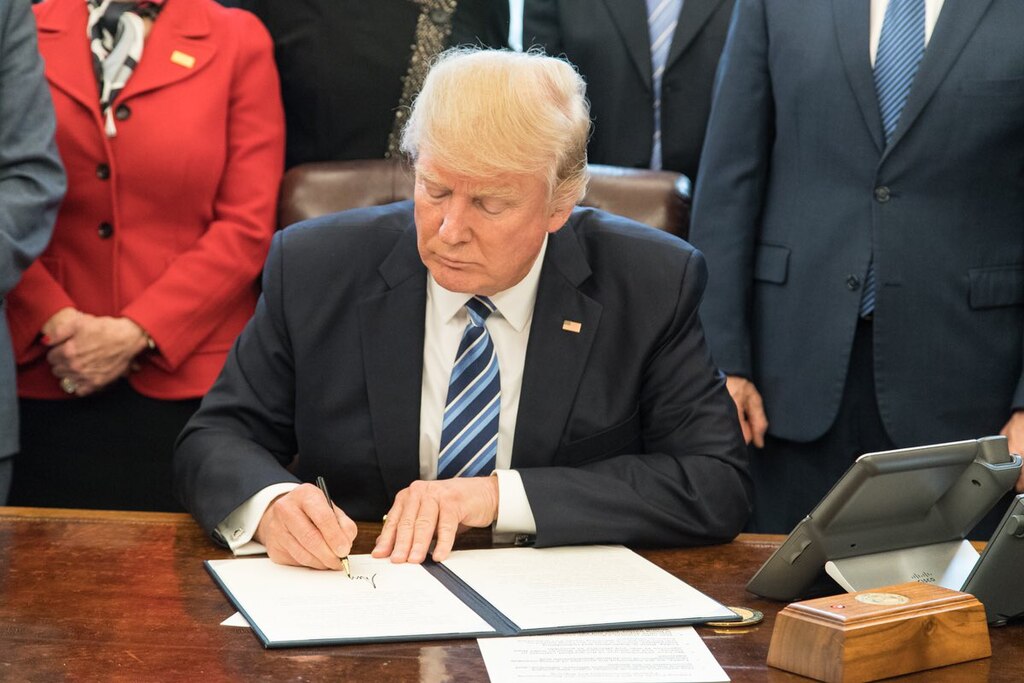The U.S. Department of Homeland Security (DHS) has paused several immigration programs allowing temporary settlement in the United States, according to The New York Times (NYSE: NYT). The decision follows a directive from U.S. Citizenship and Immigration Services (USCIS) leadership to halt "final decisions" on certain visa applications while the Trump administration considers permanent cancellations.
These programs provide entry pathways for immigrants from politically unstable and impoverished nations, including war-affected Ukraine. However, President Donald Trump's administration is intensifying immigration enforcement. On his first day in office, Trump issued executive orders aimed at curbing illegal immigration and enabling the deportation of millions without legal status.
The suspended programs include one that allowed migrants waiting in Mexico to apply for asylum at legal border crossings and another that granted Cubans, Haitians, Nicaraguans, and Venezuelans entry through U.S. sponsors after vetting. This move aligns with the administration's broader strategy to strengthen immigration controls, potentially targeting those who entered via Biden-era policies.
An obscure immigration statute may also be invoked, empowering state and local law enforcement to arrest and detain individuals in the U.S. unlawfully. The new measures mark a significant shift in U.S. immigration policy, with far-reaching implications for immigrants and their families.
By freezing these programs, the Trump administration signals its intent to reshape immigration pathways and bolster enforcement mechanisms. Critics argue this could undermine U.S. commitments to supporting refugees and migrants from crisis-stricken regions.
The DHS review is ongoing, leaving the future of these programs uncertain. Immigration policy remains a divisive issue, reflecting broader debates over national security, economic impact, and humanitarian obligations.



 U.S.-India Trade Framework Signals Major Shift in Tariffs, Energy, and Supply Chains
U.S.-India Trade Framework Signals Major Shift in Tariffs, Energy, and Supply Chains  Trump Signs Executive Order Threatening 25% Tariffs on Countries Trading With Iran
Trump Signs Executive Order Threatening 25% Tariffs on Countries Trading With Iran  Trump Signs “America First Arms Transfer Strategy” to Prioritize U.S. Weapons Sales
Trump Signs “America First Arms Transfer Strategy” to Prioritize U.S. Weapons Sales  Pentagon Ends Military Education Programs With Harvard University
Pentagon Ends Military Education Programs With Harvard University  Newly Released DOJ Epstein Files Expose High-Profile Connections Across Politics and Business
Newly Released DOJ Epstein Files Expose High-Profile Connections Across Politics and Business  South Korea Assures U.S. on Trade Deal Commitments Amid Tariff Concerns
South Korea Assures U.S. on Trade Deal Commitments Amid Tariff Concerns  Trump Allows Commercial Fishing in Protected New England Waters
Trump Allows Commercial Fishing in Protected New England Waters  Missouri Judge Dismisses Lawsuit Challenging Starbucks’ Diversity and Inclusion Policies
Missouri Judge Dismisses Lawsuit Challenging Starbucks’ Diversity and Inclusion Policies  China Warns US Arms Sales to Taiwan Could Disrupt Trump’s Planned Visit
China Warns US Arms Sales to Taiwan Could Disrupt Trump’s Planned Visit  Marco Rubio Steps Down as Acting U.S. Archivist Amid Federal Law Limits
Marco Rubio Steps Down as Acting U.S. Archivist Amid Federal Law Limits  Trump Endorses Japan’s Sanae Takaichi Ahead of Crucial Election Amid Market and China Tensions
Trump Endorses Japan’s Sanae Takaichi Ahead of Crucial Election Amid Market and China Tensions  U.S. Sanctions on Russia Could Expand as Ukraine Peace Talks Continue, Says Treasury Secretary Bessent
U.S. Sanctions on Russia Could Expand as Ukraine Peace Talks Continue, Says Treasury Secretary Bessent  U.S. Announces Additional $6 Million in Humanitarian Aid to Cuba Amid Oil Sanctions and Fuel Shortages
U.S. Announces Additional $6 Million in Humanitarian Aid to Cuba Amid Oil Sanctions and Fuel Shortages  UAE Plans Temporary Housing Complex for Displaced Palestinians in Southern Gaza
UAE Plans Temporary Housing Complex for Displaced Palestinians in Southern Gaza  Trump Lifts 25% Tariff on Indian Goods in Strategic U.S.–India Trade and Energy Deal
Trump Lifts 25% Tariff on Indian Goods in Strategic U.S.–India Trade and Energy Deal  TrumpRx Website Launches to Offer Discounted Prescription Drugs for Cash-Paying Americans
TrumpRx Website Launches to Offer Discounted Prescription Drugs for Cash-Paying Americans  NATO to Discuss Strengthening Greenland Security Amid Arctic Tensions
NATO to Discuss Strengthening Greenland Security Amid Arctic Tensions 




























